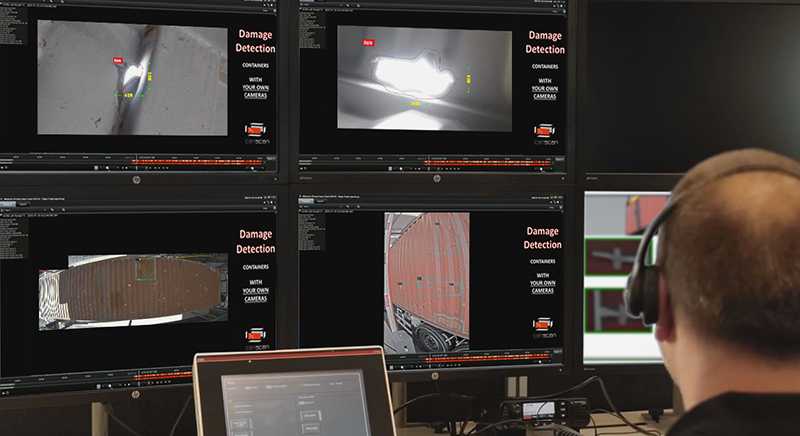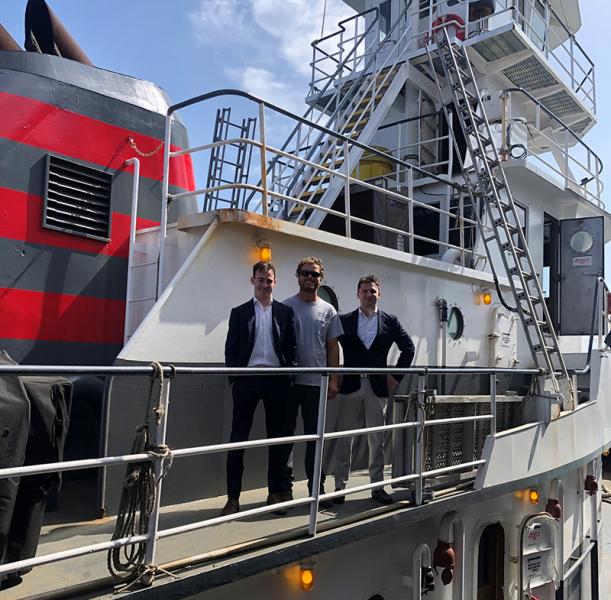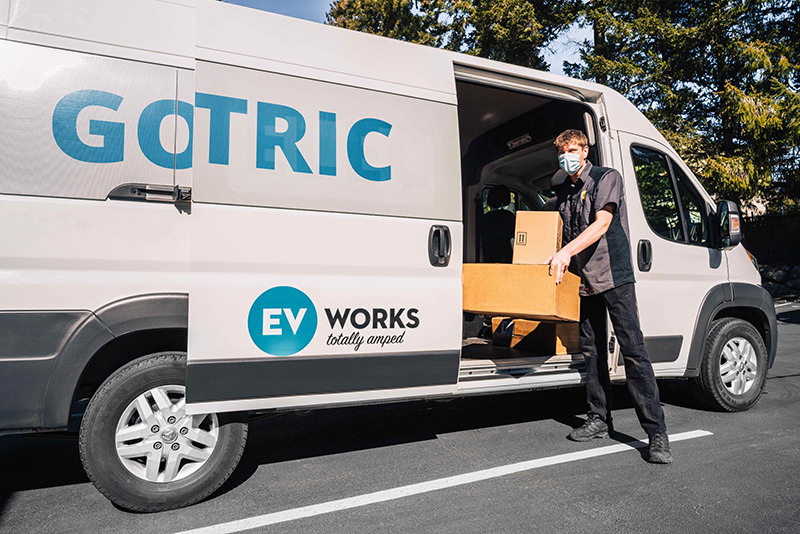
Maritime Blue, a statewide organization of maritime stakeholders, the state Department of Commerce, and the Port of Seattle, launched its second group of Maritime Innovation Accelerator start-up companies. The goal of the program is to spur new technology and investment in one of Washington’s most enduring and important industry sectors — maritime accounts for over $37 billion in economic impact annually, including 69,500 jobs. After several months of coaching, training, and purposeful networking, the companies recently pitched their products or services to a large online audience during the Maritime Blue Accelerator Showcase.
This series showcases the 11 companies participating in the second wave of the cohort. This time we’re focusing on three start-ups leveraging technology and increasing efficiency to take maritime logistics to the next level.
Canscan

Jennifer Ivens founded Canscan in 2018 as a way to tackle the problem that irritated her the most in the maritime transportation industry — the manual and inefficient process of inspecting millions of shipping containers coming into and through terminals.
“It’s a major problem; the industry is moving faster and faster and we are processing more containers every year,” she said. “We haven’t caught up with technology. We’re still tracking containers with paper and we needed to fast track the process.”
Ivens compared the process of inspecting containers to inspecting a rental car.
“You want to check that the container is in good condition when you enter the territory, so you walk around and make sure you identify the scratches and dents and have them on record so you aren’t liable.”
To increase efficiency of this process, Montreal-based Canscan developed a system, based on artificial intelligence, machine vision, and data analytics that uses existing cameras and infrastructure to automatically inspect containers transiting into or through a terminal.
“I’m excited about the potential of making people’s lives easier, and not have to do a repetitive task,” she said. “I want to make people happy in what they are doing."
Through the Maritime Accelerator program, Ivens developed a short-term strategy to connect with software providers as clients rather than terminals, ports, or depots. She said working with these companies has taken a fraction of the time it would take to make a sale to larger entities.
Long term, Ivens envisions Canscan as the company that powers every software on the market for visual inspection of containers. She also plans to evolve her software to not only detect damages but also to predict wear and tear on assets.
The Maritime Accelerator program allowed Ivens to connect with other founders who were experiencing similar challenges.
“It’s important to the mental health of someone starting a company to talk to people who understand what you are going through,” she said. “The team was very supportive; everyone was going through the same things and had helpful advice for each other.”
OpenTug

While interning in the maritime transportation industry in college, Jason Aristides saw an opportunity to use technology for a customer-centric approach to maritime logistics.
“I noticed it was hard for customers to understand our offerings or recognize if a barge or a tug was the right solution,” he said.
With this in mind, he founded OpenTug in 2019, unveiling a digital marine logistics marketplace that delivers transportation solutions at the click of a button. This tool is designed to help customers recognize maritime transport as a viable, sustainable shipping solution, reducing truck trips, emissions, and costs.
OpenTug uses online booking, tracking, marketing, and management software to allow marine companies to better connect with customers, reducing loss for both shippers and operators by automatically matching cargo to available space on marine assets and helping the industry sustainably meet growing freight demands.
“We use technology to help customers understand when a barge is available and where it is going. It’s a good opportunity for a shipper and a great opportunity for us to make use of one-way voyage with extra space,” Aristides said. “It allows us to create a more customer-centric business or niche. If we have a barge moving with available space, it won’t be a wasted run and people can get a lot of value out of that.”
OpenTug is currently operating in the Alaska market, with around 15 operators currently signed up on the digital platform and it will look to other regions on the West Coast to expand the network.
Through the Maritime Accelerator program, Aristides learned the importance of reaching out to customers over the phone and developing a connection. As a 22-year-old, he had been accustomed to text or email as a primary method of communication.
Aristides said programs like the Maritime Accelerator are crucial to fostering innovation and the future of the maritime industry.
“A newer generation is joining the workforce,” he said. “Not a lot of people look at the maritime space as a career. Even among my peers, I’m the only one I know working in maritime. New innovative companies make the industry more attractive to younger people.”
Pacific Mobility Group

Greg Dronkert has made a career out of moving people and goods on and along the water. Along the way he noticed a disconnect between different modes of transportation, from marine to rail to trucking.
He founded Pacific Mobility Group (PMG) to work on integrating and synergizing these modes of transportation and to further pursue zero emission technology in transportation. Today PMG, a Washington State social purpose corporation, is a family of businesses serving the transportation and recreation industries, with a consolidating purpose to improve people’s lives through better mobility. PMG focuses on vehicle electrification, shared mobility, and autonomous technology.
Through the Maritime Accelerator Program, Pacific Mobility is developing a commercial electric van share program to help move goods in and around ports. After cargo and goods are moved off of ships to warehouses or terminals, electric commercial vans will move goods out to small businesses and individuals.
“The vans are part of the logistics and distribution system to move product freely in and out of the port,” Dronkert said. “We’re providing these vans and operational expertise, and we’re offering them out on lease.”
PMG handles the design, installation, operation, and maintenance of electric vehicle charging infrastructure, and is currently in the process of converting Ram ProMaster cargo vans that will soon be made available to drivers and organizations through a lease and an on-demand rental program. PMG’s own electric vehicle shop performs conversions on the light and medium duty commercial vehicles.
Dronkert said his experience in the Maritime Accelerator program allowed him to develop a different mindset on funding his fleet of electric commercial vans.
“As a social purpose corporation, we were introduced to impact investors. We wanted to work with people who were aware that we are not just about profits, but about making a social contribution.”
For Dronkert, the commercial electric van share is just the beginning. PMG’s longer-term vision is a shared electric drayage fleet, moving cargo and goods from ports to warehouses or terminals, and would be available through the same technology.
Dronkert said the van share model is equitable because it lowers costs for drivers.
“Many drivers are from segments of the community that are underrepresented,” he said. “We are making equipment more efficient by having multiple drivers using the same piece of equipment within a pool. There is no lease or payment schedule to a parent company. Sometimes folks get caught under the leases in their vehicle, like taxi drivers. It can be burdensome paying so much to everyone else and there isn’t much left for the driver.”
PMG is currently looking for site hosts that want to collaborate on the installation of charge infrastructure to house the vans. Tacoma Power and PMG are collaborating to launch the first van share site in Tacoma and other sites around Puget Sound.











